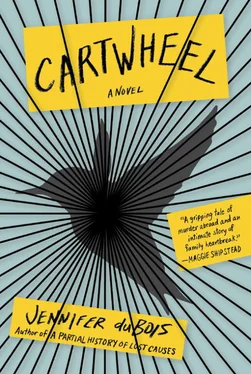Andrew tiptoed back to bed. Across the room, Anna seemed to be radiating resentful wakefulness, though she was very still; he feared that Anna was growing into the kind of daughter who would never tell him that he snored. Andrew lay back down. A line ran through his head: There is no other life but the one we have . This had been something of a mantra of his after Janie died: There was never anything more to her life in the world, he told himself, than the two and a half years she spent here. There are no other drafts, and no alternate endings. There is not a single day that rightfully belongs to our lives except for those that actually compose it.
Lying in bed, Andrew listened to the faint crepitation of a leaf against the window. He admired the recalcitrant light of the already diminishing moon. It was, after all, a very beautiful world.
Every morning at dawn, Anna donned her workout clothes and went off to run. She’d return silently, an hour or more later, and then sit in front of the mirror and pull the Band-Aids off her scabby heels while Andrew watched. At some point during her first year of college, she had turned into one long flank of muscle. In the afternoons, Andrew would make her go out with him somewhere—usually to the corner store, where he’d try to make desperate sport of all the exotic artificial flavors. Anna trailed behind him, suddenly lazy, her expression like a chunk of basalt.
“Chestnut-flavored yogurt?” Andrew would say, pointing. “Would you ever have thought?”
“There are a lot of things lately that I never would have thought.”
Andrew did not blame her; she was doing her best. Learning to be an adult was learning that your best was rarely quite enough.
“Fig-flavored soda?” he’d say. “Bet you haven’t had that before.”
“I’ve never done a lot of this before.”
On the third day after visiting Lily, while Anna was at the gym, Andrew went walking. He walked to bone-white cathedrals; he walked past houses with shrubbery growing onto them like stubble. There was dog shit everywhere, absolutely everywhere, and Andrew was impressed by the blithe acceptance of such—as though everyone had tacitly agreed that this was what the city was actually for. The sky was a pious robin’s-egg blue. Andrew thought of what it would be like to be dropped live out of an airplane, and then fall streaking through this gorgeous sky, the color of a bluebird or a crayon. He thought of what it might be like to be too terrified to scream.
Andrew would have liked to be able to tell himself that they had all survived before, but the truth was, they hadn’t. Lily’s problem, he tried to remind himself, was entirely different from Janie’s—Lily’s situation was merely a function of a failure of rationality, a failure of communication. If Andrew could explain everything very slowly and carefully then all would be clear, and everyone would see that a mistake had been made. He didn’t have to stop an oncoming tsunami or apocalypse or terminal illness; he didn’t have to attract the attention or favor of a deity. All he had to do was describe, very clearly and persuasively, a true fact about the world: that his daughter had not killed anybody. Andrew was a professional explainer. To save Lily, he needed only to do better what he already did well. What could be simpler? What, in the end, could be easier? He should be glad to have such problems! There was no tumor in this daughter’s body, no knife against this daughter’s throat—only a handful of incorrect impressions deep in the minds of a few reactionary people. As threats go, these were not the worst.
Andrew walked past another church. Etched into its exterior were saints, forever without perspective, their halos gleaming like pennies. The church was closed. Andrew stood outside the elaborate wrought-iron gates and held on.
Anna came back at eleven and took a shower. In the afternoon, Andrew left her eating a room service sandwich and watching Sex and the City 2 on HBO, which he’d ordered for her even though she told him she’d already seen it and that it had made her a worse and more stupid person. Andrew had the hotel call him a taxi and gave the driver the address of Lily’s host family in Palermo. Sebastien LeCompte’s house, Lily’s emails had suggested, was right next door and enormous, and Andrew was hoping he wouldn’t be able to miss it.
Some of the streets on the way to Palermo were questionable—Andrew saw jigsaw structures made of plywood; shifty-looking men wearing only their undershirts; shredded hunks of pork, roasting on spits in the sun and attracting bevies of jewel-winged flies—but after they crossed Figueroa Alcorta, he relaxed. Out one window loomed some sort of museum, ornate as a cupcake, and the houses grew bigger and better until they were garish and tacky and tricked out in the taste of the full-blown nouveau riche. Things got calmer and cleaner once the taxi crossed into Barrio Parque; Andrew began to feel that he was in a neighborhood inhabited by men who’d made modest fortunes honestly. Finally the taxi rounded a dusty corner and onto Lily’s street—Lily’s former street—and Andrew was once again relieved. The house that must be Sebastien LeCompte’s was unmistakable: It was right next door to the Carrizos’, and was, as promised, huge and shambling and unkempt, visibly driving down the prices of all the other real estate.
Andrew couldn’t help craning his neck to look at Lily’s former house. It was nice, he was glad to see—he’d imagined open sewage, chickens in the yard, God knew what. Even so, what the lawyers had told him about the Carrizos did not sound reassuring. The Carrizos had certain attitudes about Lily, apparently—certain prejudices and suspicions—and Andrew certainly knew how grating she could be to people who didn’t already love her. He glanced again at the house, trying to see into the courtyard, then shivered and admonished himself for being ghoulish enough to look. He averted his gaze and pointed to Sebastien LeCompte’s mansion. The taxi driver eyed it skeptically.
The house was indeed immense: For once in her life, Lily had not been hyperbolic in a postcard. Three stories of mullioned windows squatted beneath a roof that seemed to sag on one side, giving the whole house the look of a shrugging person in a buttoned waistcoat. A winding path led to an enormous door that, Andrew saw when he reached it, was carved and expensive but missing a doorknob. The knocker was a snarling stone creature; Andrew found himself involuntarily snarling right back at it. He could have put his fist through the door and into the house’s creepy interior. He did not do this. Instead, he knocked and took a few steps back. He was sweating. A warm and paltry wind kicked up and made him even warmer. He waited.
The door opened, at long last, and a thin, extremely young man appeared. He had brown hair and startling eyes and was dressed in a garment Andrew couldn’t quite make sense of—was it a robe of some kind? A smoking jacket? Maybe, Andrew thought darkly, this boy was behind Lily’s smoking. “Buenos dias,” said Andrew, because he figured that this was the best way to start.
Sebastien LeCompte did not appear surprised. He only smiled a distant smile, revealing a set of teeth that must have been very expensive. “Why, good day to you, too, sir,” he said. His accent was not what Andrew was expecting—it was nasally and harsh; the accent of British actors playing American. It did not match the outfit. “And what might you be selling?”
“You speak English?”
“I flatter myself that I do.”
“Are you Sebastien LeCompte?”
“I flatter myself that I am.”
In her emails, Lily had referred to Sebastien LeCompte as a “man” she was “seeing,” phrasing that had seemed comical to Andrew at the time but that he’d clung to after her arrest—perhaps she was dating an adult, for once, someone who was reasonable and mature, someone who might actually be of some assistance to them now. This hope had diminished when he’d seen the security footage, and now, staring at Sebastien LeCompte in the flesh, Andrew could feel it almost disappear. What he was dealing with here was a boy: rail-thin, floppy-haired, tepid in his every gesture and glance, reflexively sardonic in his every utterance, the physical instantiation of his generation’s taste in music. Grow pulses, children! Andrew wanted to yell, but he did not. The world was lucky Andrew didn’t do half the things he thought of doing. Instead, Andrew extended his hand. He had to try—it was imperative that he try—to find out if there was any chance this boy could help them, in spite of himself.
Читать дальше












